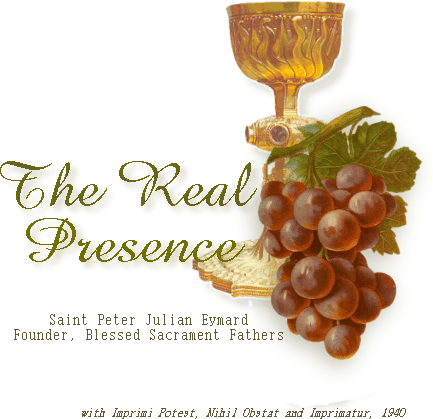 THE GOD OF OUR HEART Sentite de Domino in bonitate. Think of the Lord in goodness. (Wisdom i. 1.) I TO THE respect of instinct and of external homage should be joined a respect of love. The first honors our Lord's dignity, the second His goodness; the first is the respect of a servant, the other that of a son. The second of the two is the one our Lord prizes the more. To limit ourselves to a respect of exterior honor would be to stop at the entrance; our Lord desires to be honored above all for His goodness. In the Old Law things were different; God had written over His temple: "Tremble when you draw nigh to My sanctuary." He had to make those carnal Jews tremble and lead them by fear. But now that our Lord has become man, He wants us to serve Him through love. He has written over His tabernacle: "Come ye all to Me, and I will refresh you. Come, I am meek and humble of heart." All that our Lord did during His mortal life was to win for Himself the title But it is now, in the Eucharist, that our Lord wishes to enjoy His title of "Good Master." Far from losing in kindness towards us, He has increased His intimacy with us. He wants us to dwell on His tenderness and find joy in His presence; He wants us to be drawn to His feet by the sheer happiness of seeing Him. Therein is the reason why He veils Himself sacramentally. We are more attracted by what is great than by what is good. If our Lord were to manifest His glory, we would halt there without going on to His Heart. We would be like the Jews; our Lord wants us to be like children. That is why our Lord requires exterior respect only as the first act that leads us to His Heart and makes us abide in His peace. If we saw our Lord in His greatness, we would tremble and throw ourselves prostrate upon the ground; but we would never make an act of love. You see, we are not yet in Heaven. Certain books speak of nothing but the majesty of God. That is all very well now and then; but it is not good for us to settle on it and think of nothing else in prayer; it makes the soul weary. But when we consider the goodness of our Lord, we can pray for one hour, two hours without mental strain. If distractions come,-----and as often as they come,-----we beg pardon for them without ever growing tired; for we know that we shall always be pardoned. If things were otherwise, we should lose heart and cease praying. II WE HONOR our Lord when we meditate on His goodness. It prompts Him to action in our favor; for His goodness can flow only to something lower than itself. So that if we abase ourselves and take the lowest place, we will be deluged with His graces and kindnesses. For we are then like the poor and the little ones whom our Lord loved so much, and we can say to Him: "Thou art very good. Well, here is somebody on whom to pour out Thy goodness!" And conversation with our Lord becomes easy. If we do not go about it in that way, we behave as people do before kings: we tremble and stop shott not knowing what to say. Through His ge.ltleness our Eucharistic Lord renders even the tongues of little children eloquent; and we are all children. The goodness of the Eucharist makes it easier and more pleasant for us to pray. We have a tendency to pride ourselves on God's graces and to regard them as our own. Our Lord does not like that, for He merely lends them to us that we may trade with them, as it were, for His benefit. He allows us to be overwhelmed with distractions so as to humiliate us. We should like to pray, without distractions, but we cannot. And we say: "Since I cannot pray without sinning, I will give up prayer." That is a wrong attitude. Put yourselves under the influence of our Lord's goodness, and your sins will frighten you no longer. Divine mercy will forgive them; it is present in person before you. III IF WE thus base our worship on love, we will come into our Lord's presence with great confidence. Let us treat His love as something personal to us, and let us say to Him: "Lord, here I am, I, whom Thou hast loved so much and awaited so long; I, to whom Thou dost stretch out Thy arms." This thought will make you happy. Convince yourself of our Lord's personal love for you. No one can fail to be moved by such a thought. Besides, this personalizing of love is the secret of true and unaffected recollection. In order to be recollected in our Lord and at the same time work for Him, and to fulfill the obligations of your state of life, put yourself under the influence of our Lord's goodness. Your heart will act in Him, and that is recollection. Your mind also will be free and independent. You will be able to apply it to whatever you will; for then the head will be directed and governed by the heart, and influenced by it. Thus the presence of God pervades everything. Whereas if your mind remains always under the impression.of the majesty and grandeur of God, it becomes either lost or fatigued, and ends by losing sight either of God or of its duties. True recollection is in the heart. God has given us a mind with limited and easily overtaxed capacities, but a heart that knows no bounds. The heart can always love more, and the heart-felt presence of God can follow us everywhere. It is a source of encouragement; when it is with us, we are sure of the goodness and mercy of God; we live in His goodness. The hired servant answers promptly every beck and call of his master. No one thanks him for it; he is working for his salary. There is a fragrance to filial obedience which nothing can replace, and of which no one ever grows tired; for this obedience is affectionate and free from self-seeking. Our Lord demands it of us. He leaves a thin streamlet of it for our parents, but He wants the whole river for Himself. Let us give Him our whole heart! When therefore we come into His presence, we owe His majesty the homage of an instinctive and profound respect. But from His majesty let us go to His goodness and abide therein. Manete in dilectione Mea. "Abide in My love."  Contact Us Contact Us HOME---------------THE HOLY EUCHARIST DIRECTORY-----------------------BLESSED SACRAMENT VISITS www.catholictradition.org/Eucharist/real-presence32.htm |